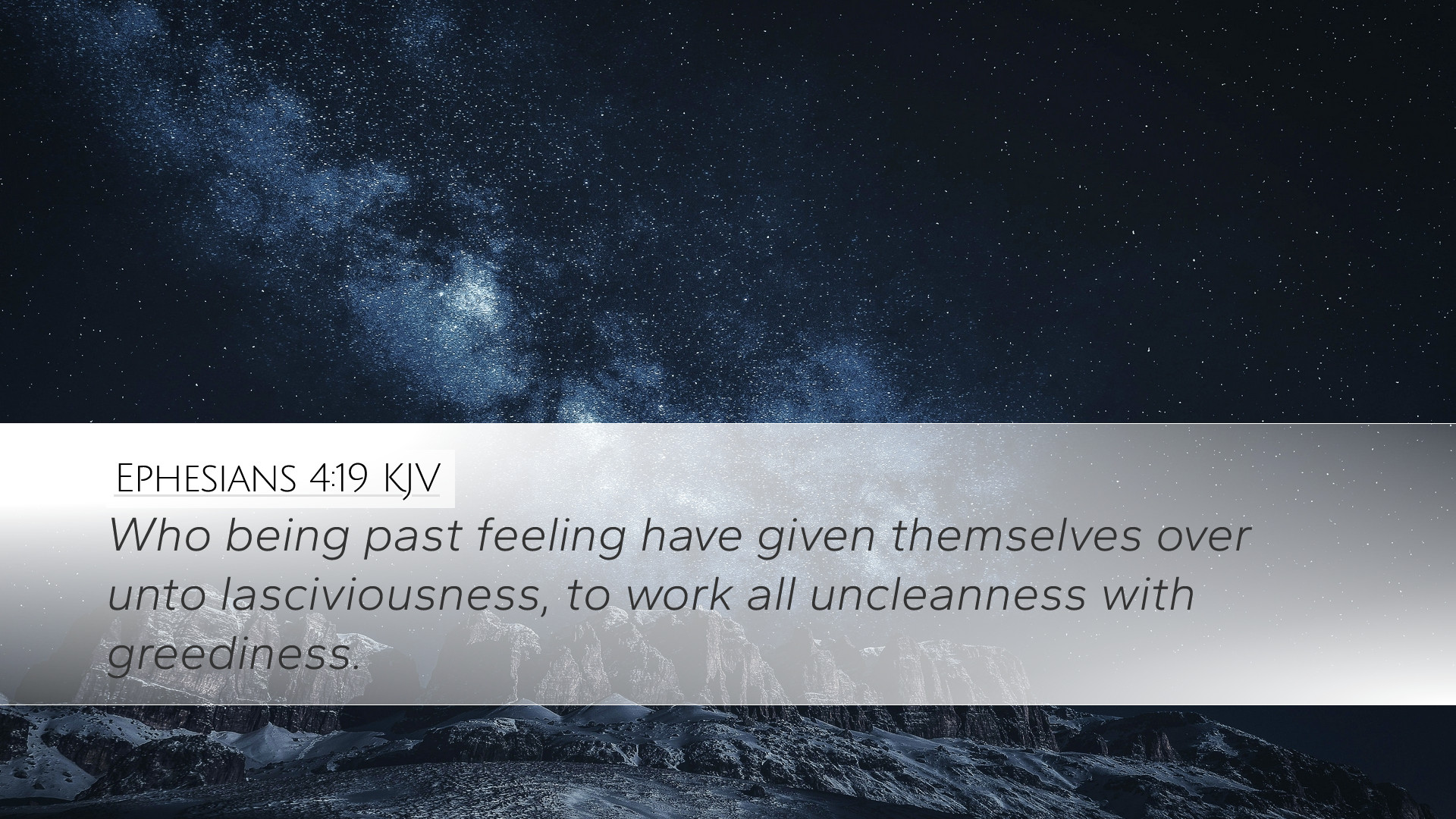Ephesians 4:19 - A Commentary
Verse Reference: Ephesians 4:19
Text: "Who being past feeling have given themselves over unto lasciviousness, to work all uncleanness with greediness."
Introduction
The verse under consideration, Ephesians 4:19, serves as a poignant reminder of the moral decline that can accompany a life devoid of spiritual sensibility. The Apostle Paul warns the Ephesian church against a state of being “past feeling,” indicating a significant spiritual and moral deterioration. In this commentary, insights from public domain sources, including Matthew Henry, Albert Barnes, and Adam Clarke, will be integrated to provide a multifaceted understanding of this important scripture.
Contextual Background
Paul's letter to the Ephesians addresses the church about the practical implications of their new identity in Christ. Earlier passages emphasize transformation through the renewing of the mind (Ephesians 4:23). Paul contrasts the behavior of the Gentiles, marked by moral corruption, with the believers' calling to holiness.
Detailed Exegesis
In this verse, Paul identifies three critical elements that characterize the sinful state of the ungodly:
- Being Past Feeling: The phrase "past feeling" (Greek: apothemata) suggests a state of insensitivity or numbness towards morality and spirituality. Matthew Henry remarks that this condition is a consequence of habitual sin, where one's conscience becomes dulled, making it easier for individuals to ignore God's moral standards.
- Given to Lasciviousness: The term "lasciviousness" refers to unrestrained indulgence in sinful desires. Albert Barnes emphasizes that this indicates a complete surrender to immoral pleasures, devoid of remorse or consciousness of wrongdoing. The work of lasciviousness leads to a breakdown of moral integrity, where desires reign supreme.
- Working All Uncleanness with Greediness: Paul further comments on the greediness associated with such sinful activities. Adam Clarke explains that this speaks to an insatiable appetite for sin and corruption, highlighting the perilous nature of unchecked desires. The term "greediness" implies a relentless pursuit of more sin, as sin’s nature is to consume and take all it can grasp.
Theological Reflections
The implications of Ephesians 4:19 are profound for contemporary Christians. Paul’s warning serves as a caution against spiritual complacency and moral indifference. Here are several theological reflections derived from the text:
- The Nature of Sin: Sin is depicted not only as an act but also as a condition of the heart. The state of being “past feeling” illustrates how pervasive sin can become if not addressed. It serves as a reminder for pastors and theologians to emphasize the necessity of repentance and spiritual awakenings.
- The Human Conscience: The conscience, a God-given mechanism for moral guidance, can be dulled or seared through habitual sin. As explored by Matthew Henry, maintaining a sensitive conscience is crucial for spiritual health. Christians are encouraged to sharpen their moral perceptions through regular engagement with Scripture and prayer.
- Holiness vs. Worldliness: The contrasting lifestyles Paul outlines challenge believers to reflect on their habits and motivations. The pursuit of holiness calls for the rejection of worldly influences and desires. This challenges church leaders to foster environments that encourage growth in godliness.
Practical Applications
For pastors, students, and scholars alike, Ephesians 4:19 offers several valuable applications:
- Self-Examination: Regularly evaluate one’s own spiritual condition and sensitivity to God’s leading. Practitioners should encourage congregants to engage in personal reflection and confession.
- Teaching on Holiness: Churches should integrate teachings on holiness and the dangers of sin into their curricula, emphasizing the transformative power of the Holy Spirit in healing the “past feeling” state.
- Community Accountability: Foster a culture within the church that encourages accountability and mutual support in the journey of faith, helping one another resist the allure of sin.
Conclusion
Ephesians 4:19 serves as a stark warning against the dangers of moral desensitization and unchecked sin. The cumulative insights from Matthew Henry, Albert Barnes, and Adam Clarke reveal the intricacies of Paul’s exhortation to the Ephesian believers. For today's church, this verse remains a relevant prompt for self-awareness, accountability, and a renewed commitment to holiness in an increasingly indifferent world.


